外研版八年级上册Module 12 Help Unit 3-1教学课件(共28张PPT)
文档属性
| 名称 | 外研版八年级上册Module 12 Help Unit 3-1教学课件(共28张PPT) | 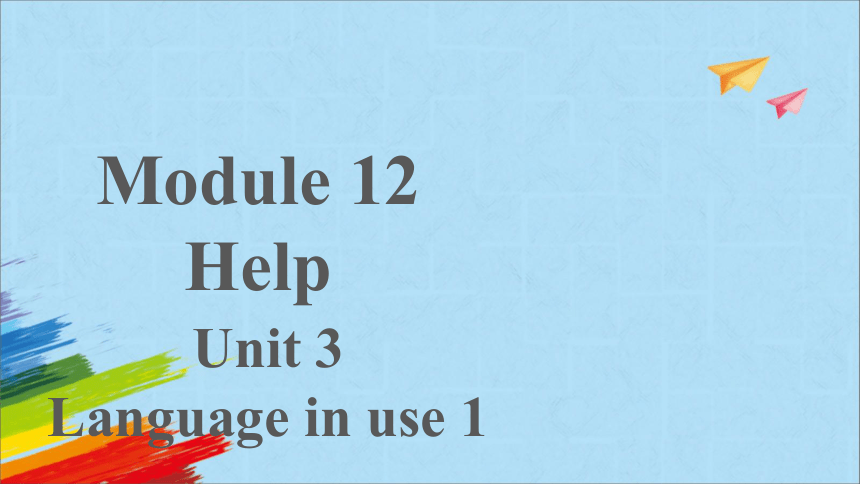 | |
| 格式 | pptx | ||
| 文件大小 | 1.9MB | ||
| 资源类型 | 教案 | ||
| 版本资源 | 外研版 | ||
| 科目 | 英语 | ||
| 更新时间 | 2022-10-14 21:17:40 | ||
图片预览

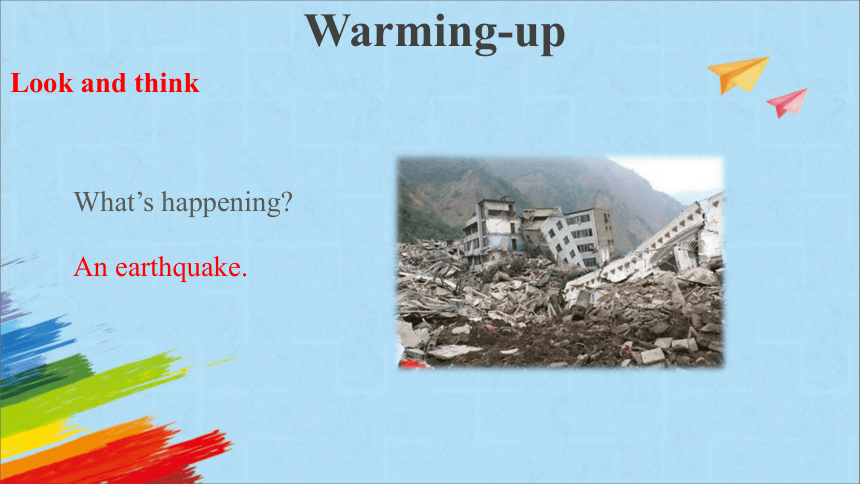

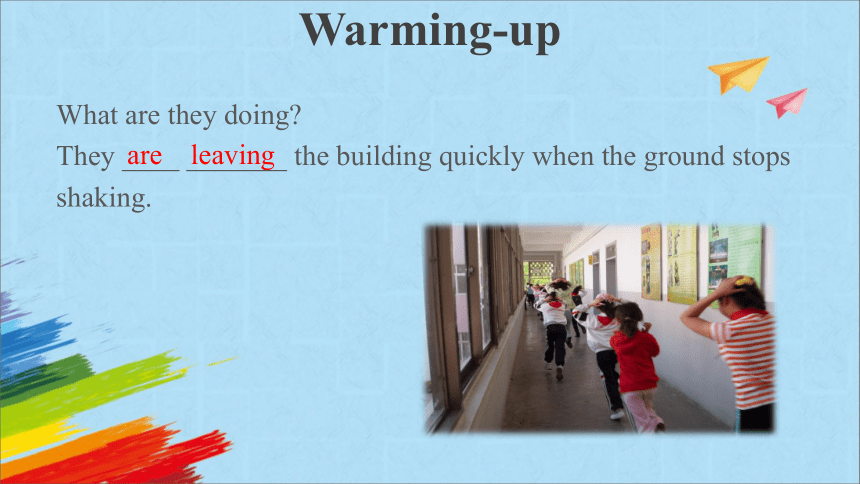
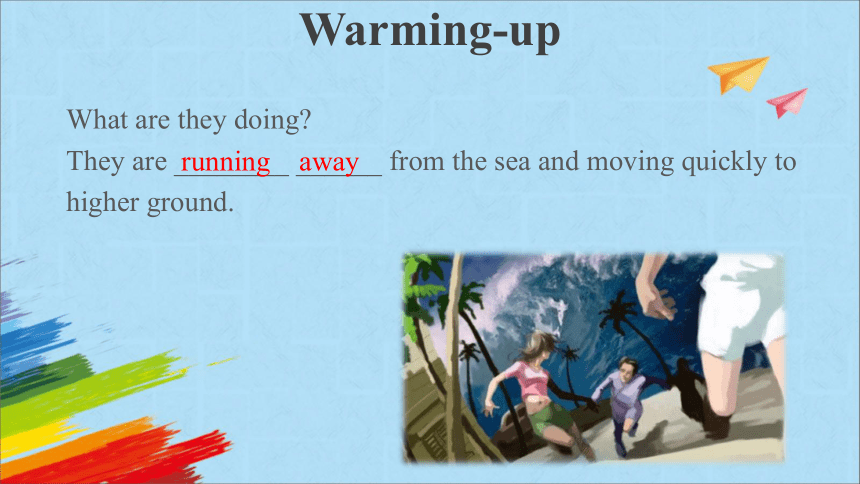
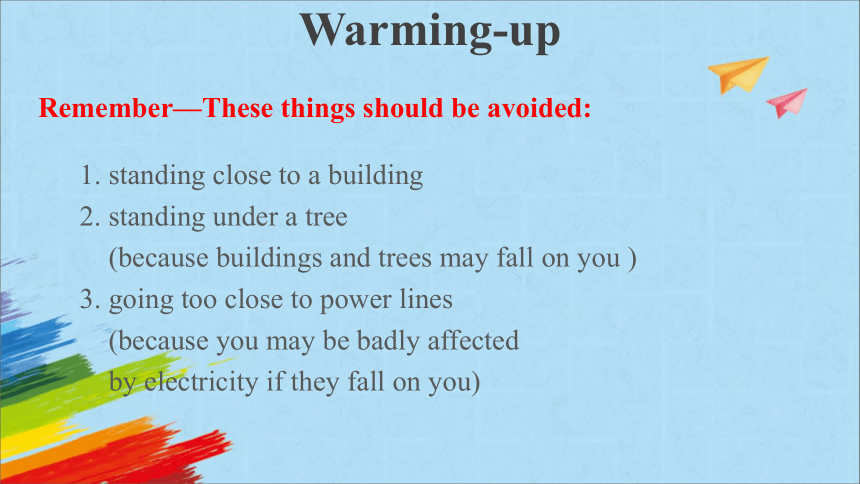
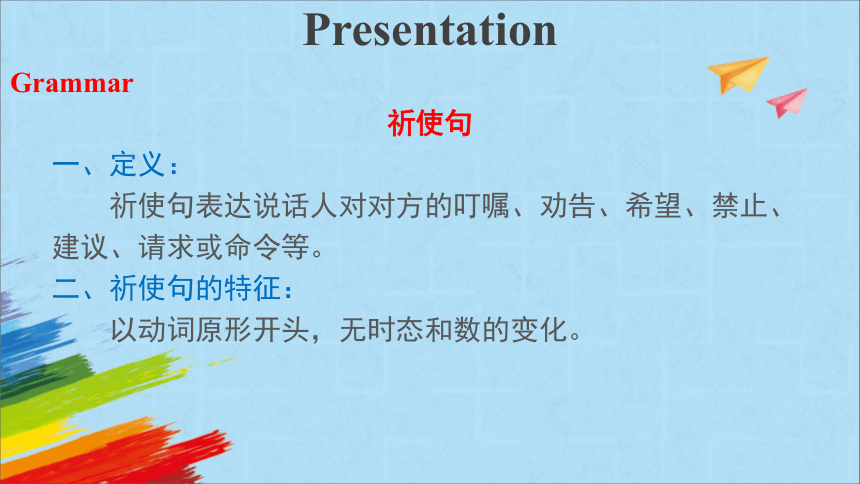
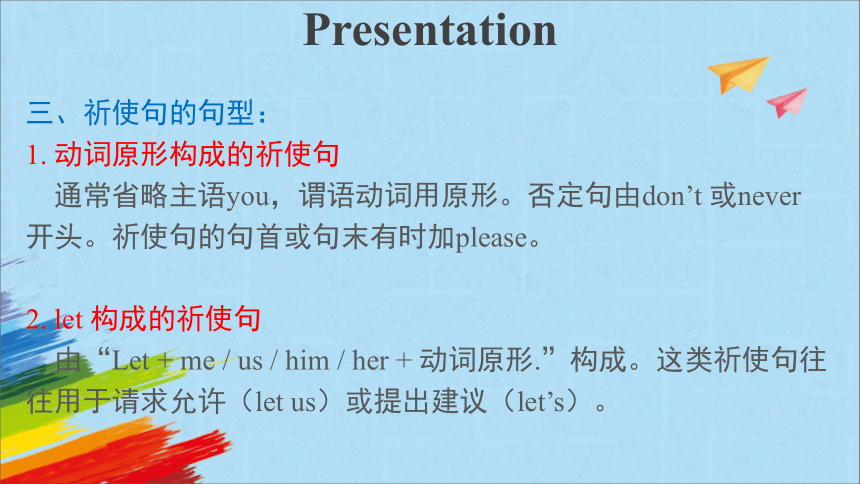

文档简介
(共28张PPT)
Module 12
Help
Unit 3
Language in use 1
What’s happening
An earthquake.
Warming-up
Look and think
What are they doing
They are ______ ______ the tables.
hiding under
Warming-up
What are they doing
They ____ _______ the building quickly when the ground stops shaking.
are leaving
Warming-up
What are they doing
They are ________ ______ from the sea and moving quickly to higher ground.
running away
Warming-up
1. standing close to a building
2. standing under a tree
(because buildings and trees may fall on you )
3. going too close to power lines
(because you may be badly affected
by electricity if they fall on you)
Remember—These things should be avoided:
Warming-up
祈使句
一、定义:
祈使句表达说话人对对方的叮嘱、劝告、希望、禁止、建议、请求或命令等。
二、祈使句的特征:
以动词原形开头,无时态和数的变化。
Presentation
Grammar
三、祈使句的句型:
1. 动词原形构成的祈使句
通常省略主语you,谓语动词用原形。否定句由don’t 或never 开头。祈使句的句首或句末有时加please。
2. let 构成的祈使句
由“Let + me / us / him / her + 动词原形.”构成。这类祈使句往往用于请求允许(let us)或提出建议(let’s)。
Presentation
例如:
Let’s spend this weekend in the countryside.
Let him be here by ten o’clock.
3. 无动词祈使句
在请求,命令和口号中,常用无动词祈使句,它实际上是省略了动词,从而使语句更简洁有力。
Presentation
例如:
Just a minute, please!
在一些指示牌上,常用“No + 动名词 / 名词 !”
构成省略的否定祈使句。
例如:No smoking!
Presentation
Presentation
情态动词must, can, could 表示推测
一、我们已经学习的表推测的情态动词有:
must / can / could / may / might
二、表推测的三种句式:
1. 在肯定句中一般用 must, can / could, may / might,程度
逐渐减弱。
He must / may / might know the answer to this question.
You have worked all this week. You must be tired.
Presentation
2. 在否定句中用can’t / couldn’t (不可能), may not / might not
(可能不)。
e.g. It can’t / couldn’t be the headmaster. He has gone to
America.
He may not / might not know the scientist.
3. 在疑问句中,一般只使用can / could。
e.g. Could he have finished the task
Can he be at home now
顺口溜:
can 不肯,
may 不问,
must 肯定不否问。
can 不肯,即:can (could) 一般不用于肯定句;
may 不问,即:may (might) 一般不用于疑问句;must 肯定不否问,即:must一般仅用于肯定句,
不用于否定句和疑问句。
Presentation
1. That ______ be harmful!
2. Betty, you ______ know!
3. _____ _____ from windows and heavy furniture.
4. ______ ______ _____ street lights or under power
lines.
Stay away
must
could
Don’t stand near
用适当的单词补全句子。
Practice
Language practice
1. —Where is George
—He ________ be here just now. His coffee is still warm.
A. need B. can’t C. must D. shouldn’t
2. Mr. Smith ________ at home. He has gone to Hong Kong.
A. can B. can’t C. must D. mustn’t
3. This book ________ be Lucy’s. Look! Her name is on it.
A. can B. may C. must D. might
Practice
Grammar exercises
1. It’s dangerous. You ________ keep out!
2. These stairs are not safe. You ________ use them.
3. The rocks are falling down. You ________ get hit.
4. The river is too deep. You ________ swim in it.
5. Betty _____ know what to do because she did some
basic medical training.
must
mustn’t
could
mustn’t
must
Practice
Complete the sentences with could, must or mustn’t.
1. Get / Do not get medical help immediately.
2. Ask / Do not ask them where the pain is.
3. Lift / Do not lift them because you may drop them.
4. Keep / Do not keep them warm.
Practice
Underline the correct words to complete the first aid instructions.
do not use hide under keep leave stay away
When there is an earthquake ...
1. ____________ from the windows.
2. ____________ a table.
3. ____________ the lift.
4. ____________ the building quickly when the ground
stops shaking.
6. ____________ calm.
Stay away
Hide under
Do not use
Leave
Keep
Practice
Complete the poster about earthquakes with the correct form of the words and expressions in the box.
Tony: Daming is training hard for the big match.
Lingling: Yes, the team has a good (1) ____________
this year.
Tony: Oh, no, Daming’s (2) ____________. He’s down!
Lingling: It looks like he’s (3) ____________.
in pain
chance
in trouble
chance Cover in pain in trouble medical
Practice
Complete the conversation with the words and expressions in the box.
Tony: Daming, what happened
Daming: It’s my leg.
Lingling: (4) ____________ him with my coat.
Tony: But don’t move him. Let’s wait for someone with (5) ____________ training.
Lingling: OK.
medical
Cover
Practice
clear inside power rock trouble warn
Information is coming in that there could be (1) ________
because of heavy rain in the north. The government is (2) _________ people about falling (3) _________. Some roads have a lot of rocks on them, but people are trying to (4) __________ them quickly. In some places there is no (5) __________. And people must stay (6) __________ to keep away from falling rocks.
trouble
warning
rocks
clear
power
inside
Practice
Complete the news report with the correct form of the words in the box.
1. There are problems everywhere because of rain.
2. The government is warning people about an earthquake.
3. Some roads in the mountains have a lot of rocks on them.
4. People are trying to clear the rocks off the roads.
5. There is no problem with power.
×
×
√
√
×
Practice
Now read the report again and check (√)the true sentences.
1. We were having ________ at home when the earthquake happened.
2. The room started to ________.
3. Father shouted to everyone to get under the _____________.
4. We could not get out of the room because the ______ would not open.
5. My father called for help on his ____________.
6. People came to help us and we left our _______.
dinner
shake
kitchen table
door
mobile phone
flat
Practice
Listen and complete the sentences.
1. They have got lots of homeworks to do.
2. When you accept a present, you must use both hand.
3. You mustn’t break anything. It’s bad lucky.
4. There are so much people in the library.
5. It was very different from a China wedding.
homework
hands
luck
many
Chinese
一、请找出下列各句中的错误并改正过来。
Consolidation
Consolidation
1. I’m too tired. Let’s stop ________ (have) a rest.
2. He went to school without ________ (eat) breakfast
this morning.
3. He couldn’t wait ________ (eat) the cake.
4. Must I ________ (do) it now
5. The window is broken. Try ________ (find) out who
broke it.
to have
eating
to eat
do
to find
二、用所给词的适当形式填空。
Summary
祈使句
1. 祈使句的定义
2. 祈使句的特征
3. 祈使句的句型
情态动词must, can, could 表示推测
1. must 意为“必须、一定、应该”,表示必要或很重要或提出建议的意思。
2. can意为“能”,会表示某人具有某种本领或技能。
3. could的用法与can相似,但是比can的语气更加委婉。通常表示能力,通
常意为“可以”,“能够”。
1. Sort out the grammar points.
2. Finish the exercises on the exercise book.
Homework
Goodbye!
Module 12
Help
Unit 3
Language in use 1
What’s happening
An earthquake.
Warming-up
Look and think
What are they doing
They are ______ ______ the tables.
hiding under
Warming-up
What are they doing
They ____ _______ the building quickly when the ground stops shaking.
are leaving
Warming-up
What are they doing
They are ________ ______ from the sea and moving quickly to higher ground.
running away
Warming-up
1. standing close to a building
2. standing under a tree
(because buildings and trees may fall on you )
3. going too close to power lines
(because you may be badly affected
by electricity if they fall on you)
Remember—These things should be avoided:
Warming-up
祈使句
一、定义:
祈使句表达说话人对对方的叮嘱、劝告、希望、禁止、建议、请求或命令等。
二、祈使句的特征:
以动词原形开头,无时态和数的变化。
Presentation
Grammar
三、祈使句的句型:
1. 动词原形构成的祈使句
通常省略主语you,谓语动词用原形。否定句由don’t 或never 开头。祈使句的句首或句末有时加please。
2. let 构成的祈使句
由“Let + me / us / him / her + 动词原形.”构成。这类祈使句往往用于请求允许(let us)或提出建议(let’s)。
Presentation
例如:
Let’s spend this weekend in the countryside.
Let him be here by ten o’clock.
3. 无动词祈使句
在请求,命令和口号中,常用无动词祈使句,它实际上是省略了动词,从而使语句更简洁有力。
Presentation
例如:
Just a minute, please!
在一些指示牌上,常用“No + 动名词 / 名词 !”
构成省略的否定祈使句。
例如:No smoking!
Presentation
Presentation
情态动词must, can, could 表示推测
一、我们已经学习的表推测的情态动词有:
must / can / could / may / might
二、表推测的三种句式:
1. 在肯定句中一般用 must, can / could, may / might,程度
逐渐减弱。
He must / may / might know the answer to this question.
You have worked all this week. You must be tired.
Presentation
2. 在否定句中用can’t / couldn’t (不可能), may not / might not
(可能不)。
e.g. It can’t / couldn’t be the headmaster. He has gone to
America.
He may not / might not know the scientist.
3. 在疑问句中,一般只使用can / could。
e.g. Could he have finished the task
Can he be at home now
顺口溜:
can 不肯,
may 不问,
must 肯定不否问。
can 不肯,即:can (could) 一般不用于肯定句;
may 不问,即:may (might) 一般不用于疑问句;must 肯定不否问,即:must一般仅用于肯定句,
不用于否定句和疑问句。
Presentation
1. That ______ be harmful!
2. Betty, you ______ know!
3. _____ _____ from windows and heavy furniture.
4. ______ ______ _____ street lights or under power
lines.
Stay away
must
could
Don’t stand near
用适当的单词补全句子。
Practice
Language practice
1. —Where is George
—He ________ be here just now. His coffee is still warm.
A. need B. can’t C. must D. shouldn’t
2. Mr. Smith ________ at home. He has gone to Hong Kong.
A. can B. can’t C. must D. mustn’t
3. This book ________ be Lucy’s. Look! Her name is on it.
A. can B. may C. must D. might
Practice
Grammar exercises
1. It’s dangerous. You ________ keep out!
2. These stairs are not safe. You ________ use them.
3. The rocks are falling down. You ________ get hit.
4. The river is too deep. You ________ swim in it.
5. Betty _____ know what to do because she did some
basic medical training.
must
mustn’t
could
mustn’t
must
Practice
Complete the sentences with could, must or mustn’t.
1. Get / Do not get medical help immediately.
2. Ask / Do not ask them where the pain is.
3. Lift / Do not lift them because you may drop them.
4. Keep / Do not keep them warm.
Practice
Underline the correct words to complete the first aid instructions.
do not use hide under keep leave stay away
When there is an earthquake ...
1. ____________ from the windows.
2. ____________ a table.
3. ____________ the lift.
4. ____________ the building quickly when the ground
stops shaking.
6. ____________ calm.
Stay away
Hide under
Do not use
Leave
Keep
Practice
Complete the poster about earthquakes with the correct form of the words and expressions in the box.
Tony: Daming is training hard for the big match.
Lingling: Yes, the team has a good (1) ____________
this year.
Tony: Oh, no, Daming’s (2) ____________. He’s down!
Lingling: It looks like he’s (3) ____________.
in pain
chance
in trouble
chance Cover in pain in trouble medical
Practice
Complete the conversation with the words and expressions in the box.
Tony: Daming, what happened
Daming: It’s my leg.
Lingling: (4) ____________ him with my coat.
Tony: But don’t move him. Let’s wait for someone with (5) ____________ training.
Lingling: OK.
medical
Cover
Practice
clear inside power rock trouble warn
Information is coming in that there could be (1) ________
because of heavy rain in the north. The government is (2) _________ people about falling (3) _________. Some roads have a lot of rocks on them, but people are trying to (4) __________ them quickly. In some places there is no (5) __________. And people must stay (6) __________ to keep away from falling rocks.
trouble
warning
rocks
clear
power
inside
Practice
Complete the news report with the correct form of the words in the box.
1. There are problems everywhere because of rain.
2. The government is warning people about an earthquake.
3. Some roads in the mountains have a lot of rocks on them.
4. People are trying to clear the rocks off the roads.
5. There is no problem with power.
×
×
√
√
×
Practice
Now read the report again and check (√)the true sentences.
1. We were having ________ at home when the earthquake happened.
2. The room started to ________.
3. Father shouted to everyone to get under the _____________.
4. We could not get out of the room because the ______ would not open.
5. My father called for help on his ____________.
6. People came to help us and we left our _______.
dinner
shake
kitchen table
door
mobile phone
flat
Practice
Listen and complete the sentences.
1. They have got lots of homeworks to do.
2. When you accept a present, you must use both hand.
3. You mustn’t break anything. It’s bad lucky.
4. There are so much people in the library.
5. It was very different from a China wedding.
homework
hands
luck
many
Chinese
一、请找出下列各句中的错误并改正过来。
Consolidation
Consolidation
1. I’m too tired. Let’s stop ________ (have) a rest.
2. He went to school without ________ (eat) breakfast
this morning.
3. He couldn’t wait ________ (eat) the cake.
4. Must I ________ (do) it now
5. The window is broken. Try ________ (find) out who
broke it.
to have
eating
to eat
do
to find
二、用所给词的适当形式填空。
Summary
祈使句
1. 祈使句的定义
2. 祈使句的特征
3. 祈使句的句型
情态动词must, can, could 表示推测
1. must 意为“必须、一定、应该”,表示必要或很重要或提出建议的意思。
2. can意为“能”,会表示某人具有某种本领或技能。
3. could的用法与can相似,但是比can的语气更加委婉。通常表示能力,通
常意为“可以”,“能够”。
1. Sort out the grammar points.
2. Finish the exercises on the exercise book.
Homework
Goodbye!
同课章节目录
- Module 1 How to learn English
- Unit 1 Let's try to speak English as much as possi
- Unit 2 You should smile at her.
- Unit 3 Language in use .
- Module 2 My home town and my country
- Unit 1 It's taller than many other buildings.
- Unit 2 Cambridge is a beautiful city in the east o
- Unit 3 Language in use .
- Module 3 Sports.
- Unit 1 Nothing is more exciting than playing tenni
- Unit 2 This year we training more carefully.
- Unit 3 Language in use .
- Module 4 Planes, ships and trains .
- Unit 1 He lives the farthest from school.
- Unit 2 What is the best way to travel.
- Unit 3 Language in use .
- Module 5 Lao She Teahouse.
- Unit 1 I wanted to see the Beijing Opera.
- Unit 2 It descibes the changes in Chinese society.
- Unit 3 Language in use .
- Module 6 Animals in danger.
- Unit 1 It allows people to get closer to them .
- Unit 2 The WWF is working hard to save them all.
- Unit 3 Language in use .
- Revision module A
- Module 7 A famous story
- Unit 1 Alice was sitting with her sister by the ri
- Unit 2 She was thinking about her cat.
- Unit 3 Language in use .
- Module 8 Accidents
- Unit 1 While the car were changing to red, a car s
- Unit 2 I was trying to pick it up when it bite me
- Unit 3 Language in use .
- Module 9 Population
- Unit 1 The population of China is about 1.37 billi
- Unit 2 Arnwick was a city with 200,000 people.
- Unit 3 Language in use .
- Module 10 The weathe
- Unit 1 It might snow.
- Unit 2 The weather is fine all year round.
- Unit 3 Language in use .
- Module 11 Way of life
- Unit 1 In China ,we open a gift later.
- Unit 2 In England, you usually drink tea with milk
- Unit 3 Language in use .
- Module 12 Help
- Unit 1 What should we do before help arrives?
- Unit 2 Stay away from windows and heavy furniture.
- Unit 3 Language in use .
- Revision module B
